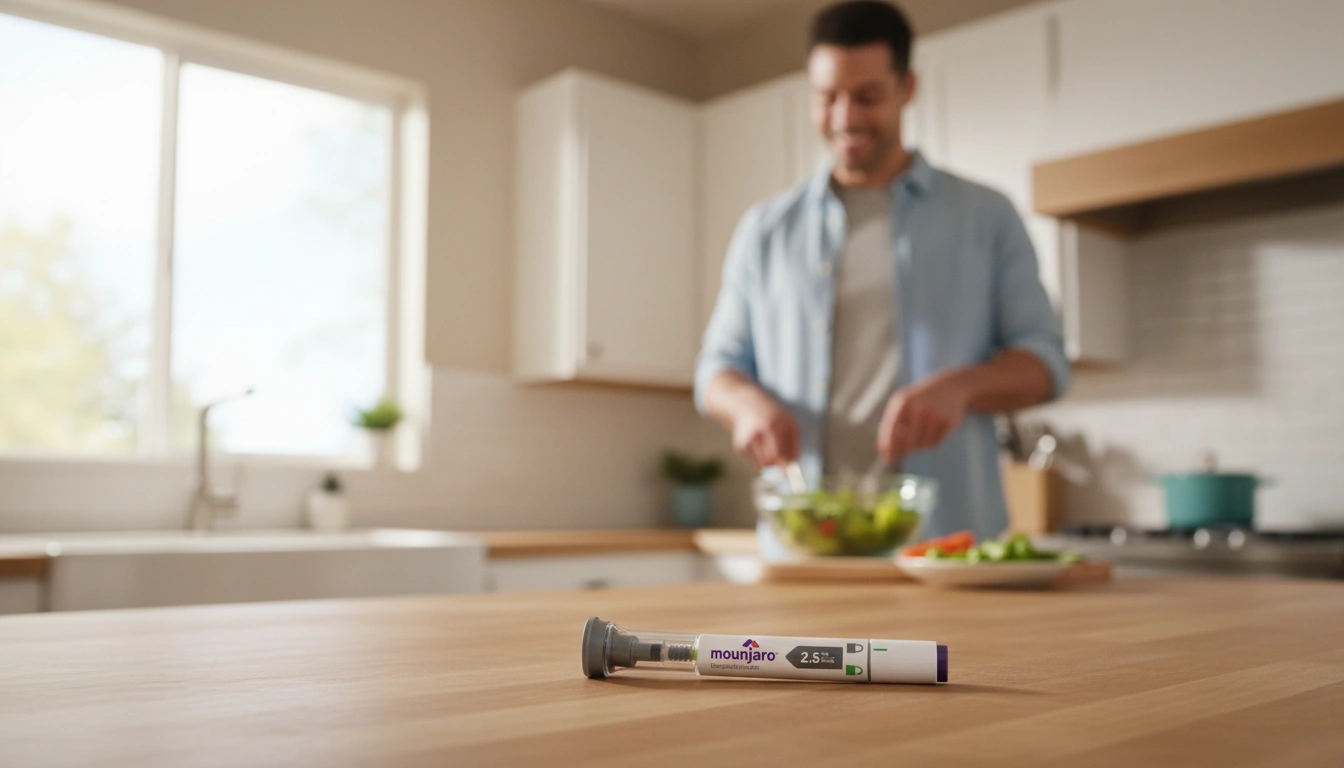What Happens When You Stop Losing Weight on Mounjaro?

Introduction
Have you ever found yourself on a weight loss journey, riding the wave of success only to hit a wall? For many, medications like Mounjaro can serve as a powerful ally in achieving weight loss goals. However, the journey is not always smooth; it can lead to unexpected challenges, especially when the scales refuse to budge.
Let’s consider this: a recent survey revealed that nearly 40% of individuals using weight loss medications experience plateaus where weight loss stalls, leaving them frustrated and confused. If you’re currently navigating this situation, know that you’re not alone, and there are ways to understand and address these challenges.
In this blog post, we will delve into the various factors that might contribute to stopping weight loss while using Mounjaro, explore the biological mechanisms at play, and offer actionable strategies to get back on track. Our goal is to provide you with a comprehensive understanding of what happens when you stop losing weight on Mounjaro, the possible reasons behind it, and how to effectively manage your weight loss journey.
Weight management can often feel like an uphill battle, especially when you’re relying on medication to facilitate your progress. Mounjaro, known generically as tirzepatide, is a medication that works by mimicking hormones that regulate appetite and blood sugar levels, making it a useful tool for many individuals seeking to lose weight. However, it is essential to understand that weight loss is not only about medication—it’s a multifaceted journey influenced by numerous factors.
In this blog post, we will explore what happens when you stop losing weight on Mounjaro, including:
- The biological reasons for weight loss plateaus.
- The impact of dietary habits and physical activity on your results.
- An overview of potential psychological factors that may affect your motivation and adherence to a healthy lifestyle.
- Practical strategies to break through plateaus and maintain your weight loss progress.
By the end of this post, we hope to equip you with the knowledge and tools needed to navigate your weight loss journey effectively, especially if you find yourself at a standstill while taking Mounjaro.
Understanding Mounjaro: How It Works
Mounjaro operates primarily by activating two key receptors in the body: GLP-1 (glucagon-like peptide-1) and GIP (gastric inhibitory polypeptide). Together, these hormones play a crucial role in regulating appetite, food intake, and glucose metabolism. Here’s how Mounjaro can support your weight loss efforts:
- Appetite Suppression: Mounjaro helps reduce feelings of hunger, making it easier to consume fewer calories. Many users report feeling fuller with smaller portions, allowing for a natural reduction in food intake.
- Slowed Gastric Emptying: The medication slows down how quickly food leaves the stomach, which can prolong feelings of fullness after eating.
- Enhanced Insulin Sensitivity: By improving insulin sensitivity and regulating blood sugar levels, Mounjaro may help prevent the spikes and dips that can lead to cravings and overeating.
However, while these mechanisms can facilitate weight loss, it’s essential to note that Mounjaro is not a standalone solution. To achieve sustainable results, it must be combined with healthy dietary choices and regular physical activity.
Why Might Weight Loss Stall?
Experiencing a plateau during your weight loss journey can be discouraging. Here are some of the most common reasons why you might stop losing weight on Mounjaro:
1. Body Adaptation to the Medication
Over time, your body may become accustomed to Mounjaro, leading to decreased effectiveness. Initially, the medication can significantly suppress appetite and aid in weight loss. However, as your body adjusts, you might find that you no longer experience the same level of appetite suppression, which can result in increased hunger and caloric intake.
2. Caloric Needs Change with Weight Loss
As you lose weight, your body’s caloric needs decrease. This means that the calorie deficit you initially maintained may no longer be sufficient for continued weight loss. For instance, a person weighing 200 pounds requires more calories to maintain their weight than someone who weighs 150 pounds. Therefore, you may need to reassess your daily caloric intake to ensure you remain in a caloric deficit.
3. Dietary Habits
Your eating habits can significantly impact your weight loss journey. If you’ve been consuming high-calorie foods or not tracking your intake, you may unintentionally exceed your caloric needs. Even with Mounjaro’s appetite-suppressing effects, it’s crucial to focus on a balanced diet rich in whole foods, lean proteins, and fiber, while avoiding ultra-processed foods that can lead to weight gain.
4. Physical Activity Levels
Regular physical activity is essential for weight loss and overall health. If your activity level has decreased—whether due to lifestyle changes, lack of motivation, or injuries—you may find it challenging to continue losing weight. Engaging in both cardiovascular and strength training exercises can enhance your metabolic rate and contribute to weight loss.
5. Psychological Factors
Mental and emotional well-being plays a significant role in weight loss success. Stress, anxiety, and depression can lead to emotional eating or a lack of motivation to maintain a healthy lifestyle. It’s essential to address these psychological factors, as they can impact your adherence to diet and exercise plans.
6. Other Medications and Health Conditions
Certain medications or underlying health conditions may affect your weight loss efforts. For instance, some medications can lead to weight gain or interfere with metabolic processes. If you suspect that other medications may be influencing your weight, it’s vital to discuss this with your healthcare provider.
Strategies to Overcome a Weight Loss Plateau
If you find yourself in a situation where weight loss has stalled while using Mounjaro, consider these actionable strategies to help break through the plateau:
1. Reassess Your Caloric Intake
Begin by calculating your new caloric needs based on your current weight. Adjust your daily intake to create a sustainable caloric deficit. This might mean reducing portion sizes or swapping high-calorie foods for healthier options. For personalized guidance, we recommend taking our free assessment quiz to explore potential adjustments that align with your weight loss goals. Take our free assessment quiz here!
2. Increase Physical Activity
Incorporate more movement into your daily routine. Aim for at least 150-300 minutes of moderate aerobic exercise each week. This can include activities like brisk walking, cycling, or swimming. Additionally, consider adding strength training exercises at least twice a week to preserve muscle mass and boost metabolism.
3. Focus on Nutrient-Dense Foods
Prioritize whole, unprocessed foods that are rich in nutrients and low in calories. Include plenty of vegetables, fruits, lean proteins, and whole grains in your diet. This not only aids in weight loss but also supports overall health. For added support, consider our GLP-1 Daily Support supplement to enhance your weight loss efforts. Explore GLP-1 Daily Support here!
4. Monitor Your Progress
Keep track of your food intake, exercise, and weight regularly to identify patterns and make necessary adjustments. Journaling or using an app to log meals and workouts can provide insights into your habits and help you stay accountable.
5. Manage Stress and Mental Well-Being
Implement stress-reduction techniques such as mindfulness, yoga, or meditation to improve your mental health. Consider seeking professional support if emotional eating or mental health challenges are affecting your weight loss journey.
6. Consult with Your Healthcare Provider
If weight loss continues to stall despite your efforts, it may be time to consult with your healthcare provider. They can evaluate your medication dosage, discuss potential alternatives, and provide tailored recommendations based on your individual health needs.
7. Stay Consistent and Patient
Weight loss is a journey, and plateaus are a natural part of that process. Focus on making sustainable changes and remember that progress may take time. Celebrate small victories along the way to maintain motivation.
Conclusion
Experiencing a weight loss plateau while using Mounjaro can be frustrating, but understanding the underlying factors can empower you to make informed decisions. By reassessing your dietary habits, adjusting your physical activity, managing stress, and staying consistent with your weight loss efforts, you can overcome these challenges and continue on your path to better health.
At TrimRx, we believe that personalized, medically supervised care is essential for sustainable weight loss. Our approach combines advanced medical science with modern technology, and we offer a supportive environment where you can thrive. If you’re struggling with your weight loss journey, consider taking our free assessment quiz to explore personalized options tailored to your needs.
Your journey toward a healthier, happier you starts today!
FAQ
What should I do if I’m not losing weight on Mounjaro?
A1: If you’re experiencing a stall in weight loss, reassess your caloric intake, increase physical activity, and focus on nutrient-dense foods. Consult with your healthcare provider for personalized guidance.
How long does it take to see results from Mounjaro?
A2: Many individuals start to see weight loss results within a few weeks, but significant changes may take 8-12 weeks to become apparent, depending on dosage and lifestyle changes.
Can I regain weight after stopping Mounjaro?
A3: Yes, it’s common for individuals to regain weight after stopping Mounjaro, especially if they do not maintain a healthy diet and exercise routine. Sustainable lifestyle changes are key to preventing weight regain.
How can I maintain my weight loss after stopping Mounjaro?
A4: Focus on a balanced diet rich in whole foods, engage in regular physical activity, manage stress, and set realistic goals to help maintain your weight loss after discontinuing Mounjaro.
What are the side effects of Mounjaro?
A5: Common side effects may include gastrointestinal discomfort, nausea, and changes in appetite. If you experience any concerning symptoms, it’s important to consult your healthcare provider.
By understanding the dynamics of your weight loss journey with Mounjaro, you can navigate the ups and downs with confidence and resilience. At TrimRx, we’re here to support you every step of the way!

Transforming Lives, One Step at a Time
Keep reading
Mounjaro First Month Results: What to Expect
During your first month on Mounjaro (tirzepatide), expect modest but meaningful weight loss. Clinical trial data from the SURMOUNT-1 study shows that participants lost…
Mounjaro 3 Month Results: What to Expect
After three months on Mounjaro (tirzepatide), most people lose between 4% and 7% of their starting body weight. Clinical trial data from the SURMOUNT-1…
Mounjaro Weight Loss Results: Clinical Data and Real Outcomes
Mounjaro has become the most talked-about weight loss medication for a reason: the results are unprecedented. Clinical trials show average weight loss of 22.5%…



